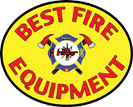Fire Extinguisher & Fire Safety Questions from the Web
The following questions were collected from our website visitors.
Q: How often must fire extinguishers be tested and tagged?
The California State Fire Marshal and most if not all AHJ’s (Authority Having Jurisdiction, i.e. county or city fire marshals) have adopted the National Fire Protection Association’s recommendations (NFPA-10) for portable fire extinguishers and codified them in the California Health and Safety Code, Title 19, Sections 13160-13190, for businesses. Fire extinguishers should be given a visual check monthly by the owner or building occupant or their designated representative, and this check should be recorded on a tag attached to the extinguisher.
Fire extinguishers must be inspected by a state-licensed fire extinguisher service company as follows:
Annually – starting from the date they are first placed in service, or date they are manufactured.
Every 5 or 6 years from the date of manufacture (depending on the type of extinguisher), they must be serviced internally. This is typically referred to as “6 year Maintenance” or “Tear Down” Maintenance.
Exception: Vehicle-mounted extinguishers (truck, boat, forklift, etc.) must be serviced internally every year.
Every 12 years (5 years for vehicle-mounted extinguishers) from date of manufacture (or last hydrotest), the cylinders must be hydrotested. See our Blog Post of November 03, 2009: FIRE EXTINGUISHER SERVICES REQUIRED BY CODES for details of each of these tests/services.
Q: Am i required to inspect a new fire extinguisher?
Yes. Fire extinguishers should be given a visual check monthly by the owner or building occupant or their designated representative, and this check should be recorded on a tag attached to the extinguisher.
Q: In California, how often must a business recharge fire extinguishers?
Technically, fire extinguishers only need to be recharged after they have been discharged or used. They do require annual inspections and other services. See our Blog Post of November 03, 2009: FIRE EXTINGUISHER SERVICES REQUIRED BY CODES for details of each of these tests/services.
Q: How often are extinguisher tear downs done?
Every 5 or 6 years from the date of manufacture (depending on the type of extinguisher), they must be serviced internally. This is typically referred to as “6 year Maintenance” or “Tear Down” Maintenance.
Exception: Vehicle-mounted extinguishers (truck, boat, forklift, etc.) must be serviced internally every year.
Q: Does a 2:A-10:BC dry chemical need six-year maintenance?
Yes. See above.
Q: What size fire extinguishers do i need for company trucks?
Most vehicles that are required to have fire extinguishers in them will have 2.5 Lb ABC extinguishers.
5 Lb, or larger, extinguishers may be required by some jurisdictions, or job sites. This also varies by the type of truck and the cargo being transported. Obviously a Gasoline Tanker would carry a larger extinguisher than a local delivery van.
Q: Do forklift fire extinguishers need annual inspections?
Yes. All fire extinguishers used in a place of business require annual inspections and periodic internal maintenance. Vehicle-mounted extinguishers (truck, boat, forklift, etc.) must be serviced internally every year.
Q: What is the maximum pressure inside of fire extinguishers?
Fire extinguishers are typically charged to an “operating pressure” of 195 psi. During hydrotesting, they are pressurized to 585 psi. This can vary with the extinguisher type and manufacturer and this information should be on the manufacturers’ nameplate label on all fire extinguishers.
Q: What is hydrostatic testing for fire extinguishers?
See our Blog Post of November 03, 2009: FIRE EXTINGUISHER SERVICES REQUIRED BY CODES for
details of this test/service.
Q: Do all new fire extinguishers come with a hydrostatic test date from the manufacturer?
Essentially, YES. All extinguishers are hydrotested at the time of manufacture. The Date of Manufacture
is either stamped or embossed on the extinguisher shell or the manufacturer’s nameplate label.
Q:What are the basic steps in performing a hydrostatic test on an extinguisher cylinder ?
See our Blog Post of November 03, 2009: FIRE EXTINGUISHER SERVICES REQUIRED BY CODES for
details of this test/service.
Q: How often to hydrotest cartridge-operated fire extinguishers?
Cartridge-operated fire extinguishers must be hydrotested every 12 years. Vehicle-mounted extinguishers (truck, boat, forklift, etc.) must be serviced internally every year and hydrotested at 5 year intervals.
Q: Why do wet chemical (K-Type) fire extinguishers need to have agent replaced?
In accordance with NFPA-10, the re-use of wet chemical extinguishing agents is not permitted. Any remaining agent in the cylinder must be completely emptied and properly discarded. Wet chemical charges are typically replaced on a 5 year cycle coinciding with the hydrotest requirements for this type of extinguisher. Because of potential performance or detrimental material compatibility problems which may occur , only the wet chemical concentrate extinguishing agent specified on the extinguisher nameplate and clean potable fresh water may be utilized for recharge.
If you have any other questions, please call or write us.

